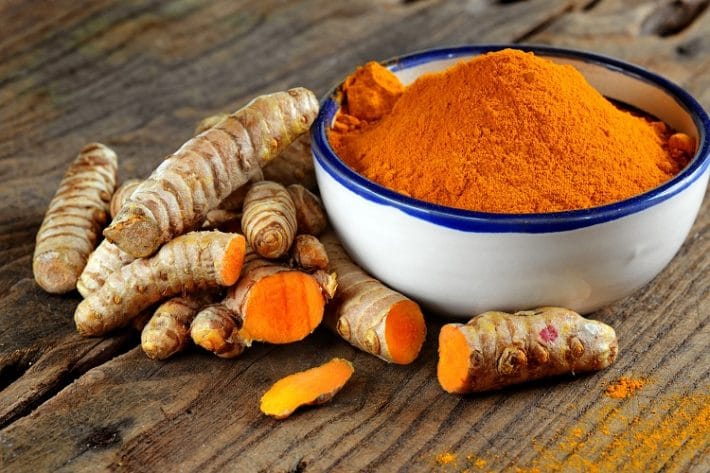THE WONDER SPICE CALLED TURMERIC
In the culinary arts, the word spice refers to any dried part of a plant, other than the leaves, used for seasoning and flavouring a recipe, but not used as the main ingredient. Why not the leaves?
Because the green leafy parts of plants used in this way are considered herbs.
Nature has a lot of spices in it’s kitty. Some of them are cinnamon, coriander, nutmeg, cloves, cumin, ginger, mace, turmeric, black pepper. The list is endless.
Out of all these spices, I will discuss turmeric. Turmeric is the spice that gives curry its yellow color. It has been used in India for thousands of years as a spice and medicinal herb. Fresh turmeric rhizome looks similar to ginger, a close relative. Both turmeric and ginger are from the Zingiberaceae family and are rhizomes. However, while the inside of turmeric is orange, the inside of ginger is yellow.
Recently, science has started to back up what Indians have known for a long time — it really does contain compounds with medicinal properties. The curcuminoids within it have potent anti-inflammatory and antioxidant activity with a wide variety of uses and benefits.
Doctors at UCLA found that curcumin, the main component in turmeric, appeared to block an enzyme that promotes the growth of head and neck cancer. In that study, 21 subjects with head and neck cancers chewed two tablets containing 1,000 milligrams of curcumin. An independent lab in Maryland evaluated the results and found that the cancer-promoting enzymes in the patients’ mouths were inhibited by the curcumin and thus prevented from advancing the spread of the malignant cells.
Dr. Randy J. Horwitz, the medical director of the Arizona Center for Integrative Medicine and an assistant professor of clinical medicine at the University of Arizona College of Medicine in Tucson, wrote a paper for the American Academy of Pain Management in which he discussed the health benefits of turmeric.
Turmeric is one of the most potent natural anti-inflammatories available, Horwitz states in the paper.
I know turmeric like the back of my hands – it is part of the spices I use in inducing the menses of women with polycystic ovarian syndrome. I am so used to it’s yellowish stains on my blender and my hands. The stomach upset and diarrhea i get each time I ingested it pushed me into checking for the side effects and I found out those are part of the side effects ! So be prepared. Let us see some of its benefits.
HELPS ARTHRITIS AND JOINT PAINS
One of the most common uses for turmeric is combating the discomfort from joint pain and arthritis. Severe arthritic symptoms include limited range of motion, joint stiffness, excessive swelling, and lack of mobility. These symptoms can get worse over time, causing permanent damage if left untreated.
Research shows that curcumin inhibits many of the mediators of inflammation linked to rheumatoid arthritis, psoriatic arthritis, and osteoarthritis development. Turmeric consistently reduces arthritis symptomology and may serve as an excellent complementary treatment for joint pain.
REDUCES CHRONIC INFLAMMATION
Inflammation describes the state of response of the body’s immune system to irritants or threats. Inflamed areas often swell up, turn red, or become painful. While this is a healthy and normal bodily reaction, sometimes the immune system goes awry. If inflammation becomes chronic, it can lead to significant health problems. Many trials have demonstrated curcumin’s anti-inflammatory properties through its inhibition of key inflammatory markers in the body. The antioxidant activity of turmeric also helps to reduce oxidative stress, a process linked to low-grade inflammation.
AIDS WEIGHT LOSS
Obesity can lead to several health issues such as high blood pressure, diabetes, heart disease, stroke, and others. If you are an otherwise healthy individual, weight loss can be pretty straight forward. However, if you have a pre-existing metabolic disorder, things can be a bit more complicated.
Several trials have shown that curcumin benefits metabolic disorders by helping stabilise metabolism and managing weight. Turmeric increases insulin sensitivity, regulates lipid metabolism, and targets fat by suppressing multiple processes responsible for the growth of adipose tissue.
IMPROVES SKIN HEALTH
Our skin is the all-important, outermost protective layer of our body. It keeps us safe from harmful microbes and regulates our internal body temperature. At times, unwanted skin conditions like chronic acne, eczema,and psoriasis may arise. Many do it yourself use turmeric to create face masks, pastes, and other topical solutions to heal the skin. Researchers have confirmed that curcumin reduces oxidative stress associated with inflammatory skin conditions. Turmeric also enhances collagen synthesis and significantly speeds up tissue repair.
NATURAL BLOOD THINNER
Blood clots occur when blood cells called platelets move to a damaged site to plug the wounded area. This occurrence is a normal bodily function. Without clotting, small papercuts would become catastrophic. At times, certain health conditions arise that require blood thinning to prevent blockages.Curcumin supplements have shown potential as an anticoagulant (blood thinner) under certain conditions.
HELPS FIGHT DISEASE AND CHRONIC CONDITIONS
The potent antioxidant properties may be one of the most significant benefits of turmeric. Curcumin has shown an innate ability to boost immune system function and protect against disease by directly inhibiting free radical cell damage and reducing oxidative stress. Turmeric can help with the following:
CANCER
Researchers have performed numerous trials on turmeric’s potential to serve as a complementary treatment in cancer patients. They’ve found that curcumin can selectively target cancer cells and inhibit tumour initiation and growth. Turmeric also helps reduce inflammation and pain from chemotherapy.
DIABETES
If you’re attempting to lower your blood sugar or prevent diabetes, turmeric may be able to help. Several trials have demonstrated curcumin’s potential in patients with type 1 or type 2 diabetes. Curcumin appears to have both an insulin-sensitizing and glucose-lowering effect while improving glycemic regulation.
HIGH BLOOD PRESSURE (HYPERTENSION)
Stabilising blood pressure and preventing hypertension is one of the most common uses of turmeric. It won’t be able to overcome poor lifestyle choices that lead to high blood pressure. However, curcumin has shown an ability to improve vascular endothelial function, a modulator of blood pressure that declines with age.
ALZHEIMER’S AND DEMENTIA
Research shows that an oral turmeric supplement may be one of the best ways to prevent dementia and Alzheimer’s disease. Curcuminoids can help reduce beta-amyloid plaque buildup on the brain and reduce neuroinflammation, two of the key biomarkers linked to Alzheimer’s development.
REGULATES CHOLESTEROL
Under certain conditions, clinical trials have concluded that turmeric can help lower triglycerides and cholesterol levels. Current evidence suggests curcumin may be beneficial if you are obese, have metabolic syndrome, diabetes, or another chronic condition affecting your blood lipid profile.
CANDIDA OVERGROWTH
We know the primary turmeric health benefits include its antibacterial, antiviral, anti-inflammatory, and antioxidant activity. Current evidence suggests curcumin also contains antifungal properties. Multiple tests concluded that turmeric could reduce candida overgrowth and target fungal infections with moderate success.
PARKINSON’S DISEASE
Parkinson’s is a neurodegenerative condition in elderly populations characterised by motor symptoms including tremors, muscle rigidity, and postural instability. Curcumin shows significant neuroprotective benefits, helping reduce neurotoxicity and oxidative stress linked to disease progression.
ENHANCES BRAIN FUNCTION
Improving overall mental health and cognitive function is one of the most popular uses of turmeric. Research shows curcumin enhances DHA synthesis which is critical for brain health. Antioxidants can also improve cognition and increase neuroplasticity, the brain’s capacity to create new synaptic connections.
REDUCES ANXIETY AND DEPRESSION
Several clinical trials have shown that turmeric can influence neurotransmitter balance in the brain. Curcumin appears to have an antidepressant and anxiolytic effect through its ability to modulate levels of serotonin and dopamine. Thus, it may be a good complementary treatment for depression.
IMPROVES ALLERGIES AND ASTHMA
An allergy transpires when the immune system mistakenly identifies a foreign substance as harmful to the body and overreacts to it. During an allergic reaction, we produce antibodies that respond to these allergens, ultimately leading to an unwanted collection of symptoms (coughing, sneezing, itching etc) .The anti-inflammatory activity of turmeric can help fight off many allergy-related symptoms and decrease the likelihood of asthma attacks. Current research suggests that a curcumin supplement can reduce signs of sneezing, nasal congestion and runny nose linked to restricted nasal airflow and hay fever.
@ Punch Newspaper

